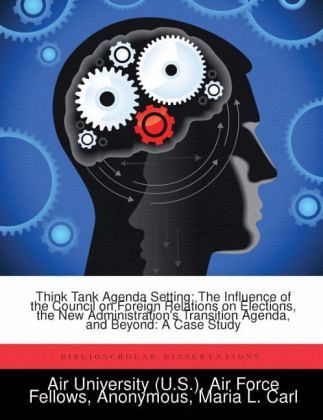
Think Tank Agenda Setting: The Influence of the Council on Foreign Relations on Elections, the New Administration's Transition Agenda, and Beyond
Versandkostenfrei!
Versandfertig in über 4 Wochen
52,99 €
inkl. MwSt.

PAYBACK Punkte
26 °P sammeln!
The idea that think tanks set the order of importance of issues seems fairly obvious--they are comprised of academics, revolving door administration officials, and other minds devoted to the full-time research and analysis of the issues facing our government and our world. They have the luxury of exploring a variety of options related to an issue and the resources to dig deeply and vertically into an issue versus the broader paintbrush strokes that official government agency and departments generally provide. In many respects, think tank influence is like that of the U.S. news media. Much like...
The idea that think tanks set the order of importance of issues seems fairly obvious--they are comprised of academics, revolving door administration officials, and other minds devoted to the full-time research and analysis of the issues facing our government and our world. They have the luxury of exploring a variety of options related to an issue and the resources to dig deeply and vertically into an issue versus the broader paintbrush strokes that official government agency and departments generally provide. In many respects, think tank influence is like that of the U.S. news media. Much like the news media, think tanks can highlight what they consider newsworthy and that highlighted information then becomes, by definition, news. American voters tend to perceive the big issues of the day as those issues on which the media focus. There has been a great deal of research and suggestion that it is the news media that are setting the public agenda in the United States. But it is not as simple as that. For example, why do the media focus on certain issues and not others? Is it due to the news value, which underlies the decisions the media professionals make? To what extent is the agenda set for the media? In some cases, organizations and individuals savvy to the business, play the media at their own game by taking advantage of news values--choosing to announce the details of an embarrassing report on the same day as another scheduled press announcement. This kind of activity is rampant in political campaign machines during election years in particular. In fact, the news media are generally exactly and only that--a medium for communicating the information of another source. To the extent an organization like the Council on Foreign Relations can influence the news media and the targeted government audience, the real source is often the think tank. Obviously, various think tanks focus on various different issues and for various effects. But once a think tank is firmly esta


